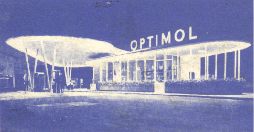OPTIMOL
Optimol was established in 1920 in Munich (München), Bavaria, and soon became a specialist in high performance lubricants and greases. In May 1990 it was acquired by the leading British lubricant specialist, Castrol (then part of Burmah), and so has now passed into the ownership of BP. The Optimol name is mainly used in German-speaking countries on synthetic and bio-degradable oils, used for specialist applications in industries such as food, textiles and printing.
Back in the 1950s and 1960s, Optimol was much more of a mainstream - yet regional - player in the market. As such, it needed to advertise its oils to the motoring public, and regularly bought space on the back covers of maps from its Munich neighbour, JRO-Verlag. |
 |
 |
The simple advert (left) was on the back of a mid-1950s map #151 of Germany. this cover was in relatively rough card, and the front (just carrying JRO's name) was similarly simple. By the end of the decade (right), the front cover of map #182 (Zentralalpen) was printed in two colours and laminated under cellophane, although the rear advert for Optimol was still printed in only one colour. In this design the words "Optimol-Öle" are bursting through newspaper cuttings. |
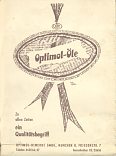 |
The front and rear covers of a ca1961 map of the Alpine lands are shown right - the Optimol factory is illustrated and described. At this level of advertising it's a fine point as to whether it should be counted as an Optimol map by JRO, or a JRO map with Optimol adverts. (I have treated similar maps from Veedol as being issued by the company.) However it is clear that the product being advertised is motor oil, and not fuels. |
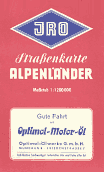 |
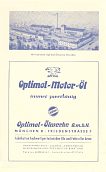 |
However Optimol did appear to make at least a tentative step into selling road fuels. A 1962 DEA atlas is known that carries a rubber stamp for "Optimol Tankstelle, Würzburg". |
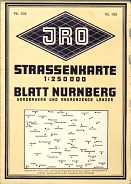
|
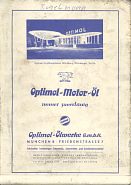
|
|
||
If you know any more about Optimol's foray into retail petrol sales, then please send me an e-mail.
Text and layout © Ian Byrne, 2004-11
All original copyrights in logos and map extracts and images are acknowledged and images are included on this site for identification purposes only.

